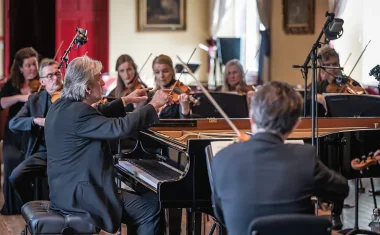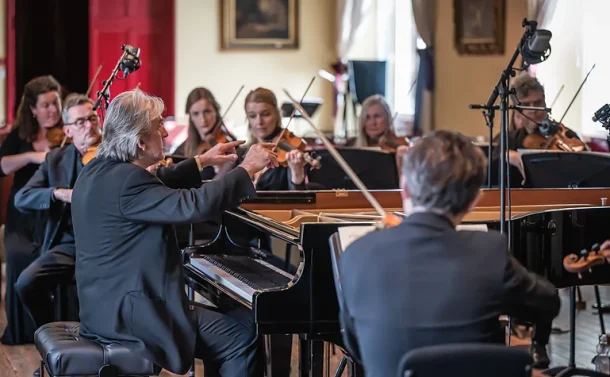 United Kingdom Mozart, Sibelius, Greg Caffrey, Mendelssohn: Aisling Agnew (flute), Camerata Ireland / Barry Douglas (conductor/piano). Clandeboye Estate, Northern Ireland, 23.8.2024. (RB)
United Kingdom Mozart, Sibelius, Greg Caffrey, Mendelssohn: Aisling Agnew (flute), Camerata Ireland / Barry Douglas (conductor/piano). Clandeboye Estate, Northern Ireland, 23.8.2024. (RB)

Mozart – Serenade No.13 in G, K525 ‘Eine Kleine Nachtmusik’
Sibelius – Romance in C, Op.42
Greg Caffrey – Environments IV
Mozart – Piano Concerto No.14 in E-flat K449
Mendelssohn: Sinfonia No.10 in B minor
This penultimate concert from the Clandeboye Festival featured very well-known works, less familiar pieces, and a completely new work by Greg Caffrey. Caffrey is an Irish composer who has won several international awards for his compositions.
The concert opened with ‘Eine Kleine Nachtmusik’ which is of course one of the most popular pieces of Classical music ever written. The key challenge in performing this piece is to make it sound completely fresh as if the orchestra were performing it for the very first time. Camerata Ireland rose to the challenge well. The opening Allegro was clean and bright while the reflective Romanza was tender with nicely tapered phrases. The Menuetto was brisk and forthright while the finale sparkled with effervescent fizz. Douglas kept a tight rein on proceedings while maintaining a careful balance of sound.
Sibelius’s Romance in C was written in 1903 and first performed the following year. It was written at a time when the composer’s family and friends were helping him to overcome the drink problems that would continue throughout his life. The short five-minute work allowed Camerata Ireland to explore darker, richer string textures and more complex tonal writing.
Greg Caffrey’s Environments IV was commissioned to celebrate the 25th anniversary of Camerata Ireland. It was created to showcase the flute as a solo instrument with orchestra. It is a concerto of sorts although Caffrey states: ‘I avoid using this term because of its nineteenth century connotation, and also because this work is a bit shorter than you might expect in a concertante work’. Aisling Agnew proved herself a brilliant exponent of the work and played on alto flute, concert flute and piccolo in turn.
The piece provided an inventive mix of orchestral textures and sonorities including some exchanges between the solo instruments and vibraphone, piano and harp. The final section where the piccolo makes its appearance was rhythmically vibrant before succumbing to bird-like lyricism. The work closed with the concert flute making an appearance before the alto flute closed the piece with a single note. It was a highly inventive piece showcasing the virtuoso potential of the various flutes while exploring interesting new orchestral sonorities.
Barry Douglas directed Mozart’s Piano Concerto No.14 in E-flat from the keyboard. It was written in February 1784 for Babette Ployer, one of Mozart’s pupils. It is considered by many to be Mozart’s first mature piano concerto. Mozart included optional oboes and horns in the score, but this performance was confined to string orchestra and piano.
Douglas succeeded in establishing a good balance and rapport with the orchestra throughout. In the opening movement, Mozart’s semiquaver runs were beautifully shaped, the ornamentation was tasteful and elegant and there was some subtle, well-judged rubato. The first movement cadenza was well executed, although in one or two places I would have preferred a little less pedal. The Andantino was a model of Classical refinement, although there were also glimpses of Romanticism. The tempo of the finale was a little slow, although the boisterous energy of the music still shone through in this performance.
Mendelssohn’s Sinfonia in B minor was written when the composer was still in his teens. It consists of a single movement in sonata form, and it opens with an expressive Adagio. Camerata Ireland’s strings sustained Mendelssohn’s long lines beautifully in the opening section and the expressive quality of the music shone through. The ensuing fast section was played with vigour and exhilaration.
Overall, there was very fine playing and an excellent rapport between all the musicians throughout these performances. It is good to see new music being programmed for the concert and I hope Greg Caffrey’s piece will find a much wider audience.
Robert Beattie
